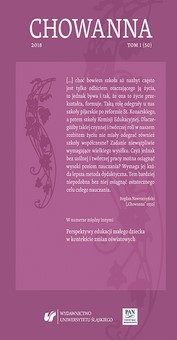Dwuwymiarowa koncepcja szczęścia (hedonizm i eudajmonia) oraz jej osobowościowe korelaty w perspektywie psychologicznych badań narracyjnych
The Two-Dimensional Concept of Happiness (Hedonism and Eudemonism) and Its Personality Correlates in the Perspective of Narrative Psychology Studies
Author(s): Dominik LalakSubject(s): Psychology, Ethics / Practical Philosophy, Personality Psychology
Published by: Wydawnictwo Uniwersytetu Śląskiego
Keywords: happiness; psychological well-being; hedonism; eudemonism; narrative structures; theory of happiness;
Summary/Abstract: The increase in material wealth in our culture makes it necessary for one to seek for other ways to gauge the quality of life. It becomes especially relevant in the face of issues threatening mental health and human condition itself, such as the number of suicides committed, addictions, depression, and chronic civilization diseases. When we are faced with these phenomena and processes, it results in investigation of factors that could possibly impact the perception and experience of happiness. The article presents research aimed at empirical verification of two models of happiness – hedonism and eudemonism. Hedonism understood as seeking for happiness in intense sensual experiences is equalled with pleasure, whereas eudemonism signifies seeking pleasure through moral development and life based on values. The main assignment given to persons participating in the study involved assessing the happiness of protagonists in each of eight narratives composing the tool devised by the author, namely the Narrative Patterns Questionnaire (Polish Kwestionariusz Schematów Narracyjnych – KSN). Moreover, relationships were sought between KSN scores and the Big Five personality traits (NEO-FFI) as well as the Self-Determination Questionnaire. Empirical indicators of hedonism and eudemonism were developed, which proved to be markedly different from assumptions of the theoretical model. The obtained results indicate among others that the level of happiness is low in persons characterised by high scores on neuroticism scale, and that persons scoring high on extraversion scale estimate their life satisfaction as high.
Journal: Chowanna
- Issue Year: 2019
- Issue No: 53 (2)
- Page Range: 197-223
- Page Count: 27
- Language: Polish

